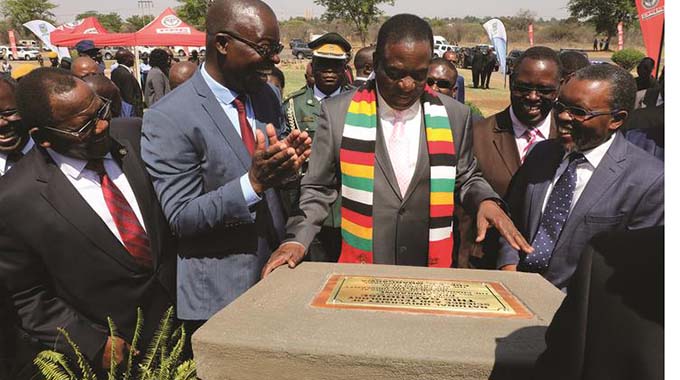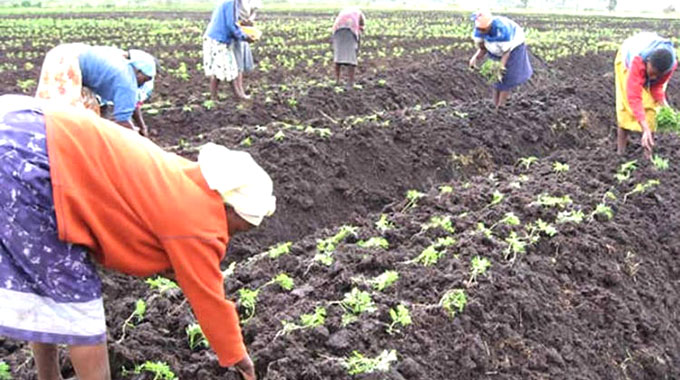Empowered chiefs’ wives raring to go

Tendai Rupapa recently in Kadoma
Distinguishable by her white apostolic sect regalia, Mrs Esther Tafira, wife to headman Gora of Mubaira Ward 6, sat attentively in the auditorium, occasionally fanning her face and wiping off sweat.
Though she made sure none of the presentations escaped her, one did not need special glasses to see that something was bothering her.
Mrs Tafira was among chiefs and headmen’s spouses who attended a two-day training workshop in Kadoma to promote healthy living and development in communities.
The workshop, which will be held across all the country’s provinces, is the brainchild of First Lady Auxillia Mnangagwa.
Health experts, church leaders, councillors and businesspeople, among other speakers, took the group through various topics that affect people in their day-to-day living.
The topics included early child marriages, gender-based violence and its impact on society, drugs and alcohol abuse and their impact on women, menstrual hygiene, sexual abuse, infertility, cancer, effects of abortion and empowerment.
And the workshop could not have come at any better time as Mrs Tafira touched many hearts when she stood up to speak about infertility.
“This issue of infertility is a heart-breaking one and I want to share my personal experience,” she said, with tears rolling down her cheeks.
“My daughter, who is now 38-years-old, got married when she was 28 and spent 10 years in marriage.
“God did not bless my daughter and son-in-law with a child. Whenever my daughter came to me crying, I would tell her that a child is a gift from God and that she should wait for God’s time.
“One day as I was seated outside our kitchen hut, I saw a truck laden with household property driving into our yard. My daughter alighted from the truck accompanied by her mother-in-law and her husband’s aunt.
“They told me they had brought back my child for failing to conceive. Her mother-in-law ‘advised’ me to visit traditional healers for help. What pained me the most is that we attend the same apostolic church and there she was, telling me to visit a n’anga.
“I asked them how they were convinced that my daughter was the cause of this childlessness, but they insisted it was her.”
Mrs Tafira said the accompanying party offloaded the truck and made off, leaving her daughter behind.
“I held her in my arms and we both cried. Is it her fault? Can this be a crime?” she said while fighting back tears.
Her son-in-law, Mrs Tafira said, remarried, but up to now he does not have a child.
“So, what if he is the one who has a problem, yet he kicked my daughter out of their matrimonial home,” she said.
So overcome with emotion, Mrs Tafira went outside the conference room, prompting the First Lady to assign one of the speakers at the event, Mrs Egnes Sithole, to offer her some counselling.
A sad atmosphere engulfed the room as some of the participants also shed tears.
The participants roundly agreed that infertility was considered a curse in most communities.
They took turns to narrate how infertile women in their communities were being sent packing, abused, called names, humiliated by their in-laws, while some ended up committing suicide.
“Some do the unspeakable like stealing babies to please their husbands and keep their marriages,” said Mrs Rudo Magaramombe, wife to headman Dumba Mutsago of Zvimba, Nyabira East.
“The heartless sometime break into the song ‘Mbereko yakaramba’ by the late Marshall Munhumumwe to spite women who fail to bear children.”
The participants pleaded with the First Lady to take her infertility awareness campaigns to fight stigma countrywide.
Amai Mnangagwa is the ambassador of Merck More than a Mother in Zimbabwe.
Merck Foundation works with African First Ladies in fighting stigma around infertility in their respective countries.
Mrs Mavis Bhinzi, wife to Chief Nebire from Kariba, has an axe to grind with elders who condone child marriages.
She said her community was awash with such cases and something needed to be done urgently to stop that.
“Child marriages in our community are happening and even men raping their relatives’ children or their own children, but some of the cases go unreported,” said Mrs Bhinzi.
“When we get to hear of the cases, sometimes it would be too late.”
Mrs Bhinzi said she was told of a case where a man in her community raped his niece, but by the time she made a follow up on the matter, the accused had vanished.
“By the time I went to their house to get finer details, the uncle had already left our community and the mother of the victim in a bid to protect her brother from going to jail, denied the allegations on his behalf,” she said.
“She had also coached her nine-year-old daughter to deny being raped by her uncle.
“I was not convinced from their testimonies and I went straight to the police and presented my case. The police went to their house and took the little girl to a clinic and it was confirmed that indeed she had been sexually abused. Up to now the perpetrator has not been arrested. I heard he fled to a neighbouring country.
“These things are happening and it is worrisome to note that families, maybe for the sake of keeping relationships, sweep the cases under the carpet and in the process, it is the girl child that suffers the most; carrying the burden of being raped and being made to conceal it by family elders.
Mrs Bhinzi said even cases of child marriages were rampant.
“Another family married off its 15-year-old daughter, but there is nothing we can do when the parents tell you to back off their family affairs,” she said.
“At one time, the minor threatened to commit suicide if her older husband was to be jailed.”
Mrs Maggie Kataminina, wife to Chief Nyamhunga of Hurungwe, said she has been trying to help by educating women in her community.
“As the chief’s wife, I always try to sit down with women in my community educating them about certain things on child marriages,” she said.
“But it seems my teachings always fall on deaf ears as they marry off the girl child. If you try to intervene, you are told to back off.”
Amai Mnangagwa recently launched the National Action Plan (NAP) and Communication Strategy Against Child Marriages, a strategy which seeks to accelerate efforts towards ending child marriages in the country.
Mrs Portia Kakamba, wife to Chief Chundu of Hurungwe, spoke out strongly against teenage pregnancies.
“Teenage pregnancies and early child marriages are rife in our community,” she said. “Also, cases of gender based violence worry me a lot.
“In most cases, orphans are being married off by relatives who would be taking care of them, yet they would not have reached the right age. If you confront the perpetrators they will tell you it was out of poverty. These children are forced into marriage against the law.
“In some instances, it is the children that are engaging in sexual activities at an early age. To alleviate some of the challenges as the chief’s wife and to compliment the First Lady’s charity work, I formed a foundation called Chundu Women Empowerment with a vision to empower women and assist orphans and other vulnerable members of the society.
“We also pay school fees for the orphans so that they are occupied with school work, thereby not thinking about marriage before time.”
Mrs Bonita Chimusora, wife to Chief Chivero said: “In my community, a man had sexual intercourse with a dog and after that went on to rape a Grade Two pupil from the same community and gave her $2. The victim, who stays with her grandmother, then gave her the money.
“When I heard of the case, I went to their homestead but to my surprise the grandmother denied everything.”
On gender based violence, the chiefs’ wives said they helped the victims to report, but before the matter goes to court or on the accused’s first appearance in court, the victims withdraw the matter.
Amai Mnangagwa said women suffered the most in circumstances where they fail to bear children and urged chiefs’ and headmen’s wives to play a leading role in making society understand infertility and that it was not a curse.
“Mostly, it’s the women who suffer the most, they are blamed, but is that justified?” she said.
“We should give these women support, not to call them names in our communities. As the chiefs’ and headmen’s wives, what are you doing to support them?
“They need our support. Go and educate your communities that infertility is not a curse.”
Amai Mnangagwa advised the chiefs’ and headmen’s wives to play a policing role for the communities in which they live.
“You should be the societal police as elders in your areas,” she said.
The First Lady, who stayed with chiefs’ and headmen’s wives in Kadoma for the two-day workshop, expressed hope that beneficiaries of the intensive training programme will be able to address various challenges they said are prevalent in their communities using the knowledge they acquired during the training.
On the other end, the participants expressed confidence that they will be able to step up to the plate.
“I am more than ready to deliver,” said Mrs Ruth Chikambi, wife to headman Chimbamauro of Zvimba.
“The skills I have acquired should benefit members of my immediate family and the community at large. I have been empowered and am ready to serve the people.
“We are grateful to our mother, the First Lady, for the educative training. As the saying goes, “educate a woman and you have empowered the nation.”











Comments